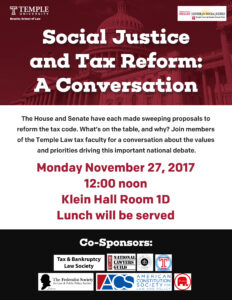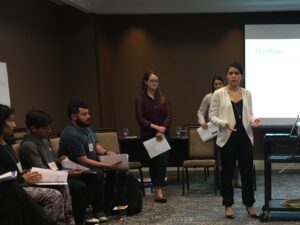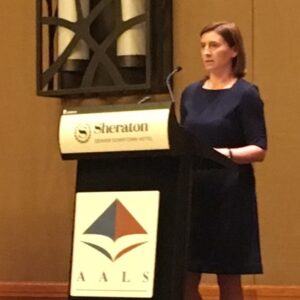 What the heck is going on with tax “reform” — and what are the implications for social justice? Join a conversation on that subject, sponsored by the Sheller Center and a diverse group of student organizations, on MONDAY, NOVEMBER 27, from 12-1 pm, in Klein 1D. Faculty panelists will include Profs. Andrea Monroe, Kathy Mandelbaum, Robert Bartow, Jan Ting and Richard Greenstein. Lunch will be provided.
What the heck is going on with tax “reform” — and what are the implications for social justice? Join a conversation on that subject, sponsored by the Sheller Center and a diverse group of student organizations, on MONDAY, NOVEMBER 27, from 12-1 pm, in Klein 1D. Faculty panelists will include Profs. Andrea Monroe, Kathy Mandelbaum, Robert Bartow, Jan Ting and Richard Greenstein. Lunch will be provided.
 About Len Rieser
About Len Rieser
Center’s report on affordable housing goes national
Danger of the Opt Out: Strategies for Preserving Section 8 Project-Based Housing in Philadelphia, a report prepared earlier this year by Justice Lab students Rita Burns, Sara Mohamed and Andrew Newstein for Community Legal Services, has been adapted for publication in the next issue of the American Bar Association’s Journal of Affordable Housing and Community Development Law.
According to the report, Philadelphia is at risk of losing significant numbers of affordable housing units as landlords “opt out” of the federal Section 8 program. The report recommends steps that the city should take in order to preserve as much affordable housing as possible.
Prof. Colleen Shanahan, director of Justice Lab, notes: “Cities around the country are facing affordable housing challenges. This article will allow attorneys, advocates, and policymakers around the country to learn from the Justice Lab student team’s data analysis and proposed solutions for Philadelphia.”
Barriers persist for non-English speakers in Pennsylvania courts
Unfinished Business, a new report from the Sheller Center for Social Justice at Temple Law School and Villanova University Charles Widger School of Law reveals that in some Pennsylvania courts, non-English speakers may not receive interpretation assistance during their hearings. This report is a follow-up study to the Sheller Center’s 2014 survey of Pennsylvania’s magisterial district judge (MDJ) courts.
The study performed court observation in 19 MDJ courts in Montgomery, Delaware, and Chester counties. It found that the majority of courts observed failed to provide certified interpreters for civil hearings. Court staff also did not consistently provide interpreters when speaking with limited English proficient individuals at the front desk nor did they uniformly provide notice of the right to language services. A minority of courts, however, were observed to provide exemplary language services.
“What is most concerning about our results is the inconsistency between courts. This means that individuals with limited English proficiency have unequal opportunities to access and participate in court matters depending on their location,” commented Anne Bonfiglio, a 3L law student and co-author of the report.
Magisterial district judge courts are Pennsylvania’s “small claims” courts. Litigants in these courts frequently do not have attorneys. Without access to adequate interpretation, non-English speaking litigants cannot understand what is happening in their court case.
The study concludes that these variations among courts came from the lack of consistent procedures and the limited accountability for courts that fail to comply with state and federal law. Further, a judge’s personal commitment to and understanding of language services directly contributed to the quality of language services provided in the courthouse.
The study comes on the heels of a comprehensive statewide Language Access Plan issued by the Supreme Court in March 2017. In order for this statewide plan to be truly effective, this report calls for statewide training of court staff and judges as well as forceful monitoring and enforcement.
Responding to Charlottesville
The Temple Law Student Bar Association with the support of every Temple Law student organization and association issued a statement in response to the events in Charlottesville. We at the Sheller Center for Social Justice share that statement here in support and solidarity with Temple Law students and our broader community. We are honored to stand with these partners as we reject racism and white supremacy in all its forms and continue to work for social justice and equality in our society.
Students create Welcoming Schools Toolkit for students, parents, and educators
The Youth Organizing Project at the Pennsylvania Citizenship and Immigration Coalition (PICC) came to the Sheller Center asking for help in creating a toolkit that would help immigrant communities advocate for the policies and practices needed to create safe and welcoming schools. After the fall election, PICC was flooded with questions from parents and teachers across PA, asking whether it was safe to send their children to school and what schools could do to protect students.
 Social Justice Lawyering Clinic Students Tessa Carson (’17), Emily Diaz (’18), and Ashley Rotchford (’18) created the Welcoming Schools Toolkit. Emily Diaz states, “its purpose is to provide students, parents, and educators with the tools to advocate for schools that are committed to ensuring that all students—regardless of their immigration status—are welcome, safe, and protected in the school environment.” The toolkit offers sample resolutions and policies that represent proactive steps that schools can take to keep children safe from immigration enforcement raids, protect students’ privacy, and affirm a commitment to inclusiveness. Diaz, along with her partners, debuted the toolkit at PICC’s statewide convening in Harrisburg, Pennsylvania in May 2017.
Social Justice Lawyering Clinic Students Tessa Carson (’17), Emily Diaz (’18), and Ashley Rotchford (’18) created the Welcoming Schools Toolkit. Emily Diaz states, “its purpose is to provide students, parents, and educators with the tools to advocate for schools that are committed to ensuring that all students—regardless of their immigration status—are welcome, safe, and protected in the school environment.” The toolkit offers sample resolutions and policies that represent proactive steps that schools can take to keep children safe from immigration enforcement raids, protect students’ privacy, and affirm a commitment to inclusiveness. Diaz, along with her partners, debuted the toolkit at PICC’s statewide convening in Harrisburg, Pennsylvania in May 2017.
A national award
For their successful effort to end Philadelphia’s practice of billing parents for cost of their child’s incarceration, Prof. Colleen Shanahan and her students have received the 2017 Clinical Legal Education Association Award for Excellence in a Public Interest Case or Project. The “Double Punishment” project, conducted by Justice Lab on behalf of the Youth Sentencing & Reentry Project, was chosen through a competitive process involving clinical work from across the country.
Justice Lab on behalf of the Youth Sentencing & Reentry Project, was chosen through a competitive process involving clinical work from across the country.
Prof. Shanahan accepted the award at the national meeting of the Clinical Section of the Association of American Law Schools in Denver this week. Hundreds of clinicians were present at the ceremony, which recognized Justice Lab and the Sheller Center. Congratulations to Prof. Shanahan, her students, and everyone who worked on this effort!
Guest post: refugee and travel bans
Temple Law students Lilah Thompson and Kimya Forouzan share their reflections on the third event in the Sheller Center’s “Making Sense of the Legal Headlines” series.
Last week, Professors Jaya Ramji-Nogales and Peter Spiro, and Jonathan Grode, Esq. spoke about the Refugee and Travel Bans imposed by Executive Order on January 27, 2017 and March 6, 2017.
For attorney and Temple Law alum Jonathan Grode, the effects were felt personally by his clients, the Assali family, who were coming to the United States through a family-based category. Although their process began in 2003, they were unable to travel to the United States until January of this year. Subsequently, they got caught up in the travel ban, and Mr. Grode was called to help.
President Trump has stated on numerous instances that his goal is a “Muslim ban.” However, the Assalis, a Christian family, were still excluded from entering the United States because they came from one of the countries on the travel ban list. Mr. Grode was eventually able to get the Assalis back into the United States after much legal and political footwork, as well as appeals to the media. However, the process was difficult and uncertain. Mr. Grode, who witnessed the ultimate family reunification at JFK Airport, stated that the moment was “like watching your child be born.”
In an effort to justify his refugee and travel bans, President Trump has persistently mischaracterized refugees. He has called refugees “illegal immigrants,” and has stated that until the government can institute an “extreme vetting” process, no refugees should be allowed into the U.S. This begs many questions: Who are refugees? Where do they come from? Why do they flee? How are they screened and vetted?
Who qualifies as a refugee?
In order to be deemed a refugee, an individual must prove that they have have a well-founded fear of persecution based on race, religion, nationality, political opinion or membership in a particular social group. Over 21 million people are refugees, 51% of whom are children. The number of refugees in the world is currently at the highest level ever recorded in human history.
Why do refugees flee?
Currently, 53% of refugees worldwide come from Syria, Afghanistan and Somalia. An estimated 11 million Syrians have fled their homes since the outbreak of the violent civil war in 2011. While situations in countries facing mass displacement and flight are different, they share important commonalities, including violence, instability, and persecution. Although President Trump has lumped refugees in with “radical Islamic terrorists,” refugees are in fact often fleeing the same terror that the U.S. is claiming to be fighting. Refugees are not simply crossing borders looking for a new life; they are forced out of their homes because it is too dangerous to survive there.
How are refugees screened, vetted, and processed to come to the United States?
As Prof. Ramji-Nogales stated, “we are already conducting extreme vetting.” In fact, Prof. Ramji-Nogales pointed out, refugees receive “the most extensive set of checks of anyone entering the United States.” Under the U.S. Refugee Admissions Program (USRAP), an interagency process that includes three primary U.S. Government agencies—Department of State, Department of Homeland Security (DHS), and the Department of Health and Human Services (HHS)—refugees are vetted based on specific requirements. This includes an in-person interview with DHS, security checks, and a medical exam. Due to these strict requirements, the screening process alone takes anywhere from 18 to 24 months. In other words, refugees are lawfully entering the United States. Once they are approved and processed to come to the U.S., refugees start on a path to citizenship.
How much does the United States do to help refugees?
Prof. Ramji-Nogales described the number of refugees the U.S. takes as a “drop in the bucket.” The ceiling for refugee admission in the U.S. is set each year; in 2015, it was 70,000. In 2017, President Trump halted even this small contribution to resettling the world’s most vulnerable people.
How does the Muslim Ban fit into the larger global issue of refugee resettlement?
Professor Spiro detailed the timeline of the recent Muslim Ban and its effects on the global issue of refugee resettlement. He detailed the specifics of the first ban, implemented on January 27, 2017, which suspended U.S. entry for those from Iran, Iraq, Yemen, Syria, Libya, and Sudan. The order went into effect immediately, and created chaos in airports throughout the United States. Additionally, the ban affected not just refugees, but also visa and green card holders, many of whom had been residing in the United States for extended periods of time but had simply traveled outside of the country when the bans went into effect. On February 3rd, a nationwide temporary restraining order was issued, and Customs & Border Protection resumed “standard policy.”
On March 6th, a second ban was ordered. The new order affected individuals from the same countries as before, although Iraq was excluded and it no longer included existing visa holders. District courts in Hawaii and Maryland shortly thereafter issued nationwide preliminary injunctions blocking the second ban.
Why is this all important?
There is a misperception that refugees are somehow dangerous terrorists. The idea that the U.S. can skirt its international obligations under the 1951 Refugee Convention to take in refugees because we equate refugees with terrorists is illogical, immoral, and illegal.
When we turn our back on refugees, we tell the world that the U.S. cannot tell the difference between a refugee, who is fleeing terror, from a terrorist, who is the oppressor. Our action says that, even with all of the facts about what refugees face, and the fact that they are screened and vetted more than any other individual who sets foot on U.S. soil, we do not care to help. It says that U.S. citizens deserve peace of mind over a refugee child’s safety from violence or death.
However, this can change. We can take in more refugees. We can fulfill our obligations under international law. We can support non-profit organizations resettling refugees, like HIAS Pennsylvania and Nationalities Service Center here in Philadelphia.
If we can contribute anything to this situation, it is information and understanding. In the face of fear politics, we must come together as a community to better understand the refugee process so we can better act towards changing the narrative.
For more information about immigration and refugee law, please check out this Resource Guide, created by Carla Wale from the Law Library.
Guest post: moving forward on criminal justice reform
Guest blogger Liza B. Fleming, a student at Temple Law, shares her reflections on last week’s Sheller-Center-sponsored panel on crime and policing (the second in our “Making Sense of the Legal Headlines” series).
“We need to be able to keep moving forward,” said Charles Ramsey, discussing police and criminal justice reform under the Trump administration. The Sheller Center panel, “Understanding the Headlines: Crime and Policing,” featured Ramsey, former Philadelphia Police Department Commissioner and co-Chair of President Obama’s Task Force on 21st Century Policing; former prosecutor Meg Reiss, now leading the Institute for Innovation in Prosecution at John Jay College of Criminal Justice; and Lauren Ouziel, former federal prosecutor and Temple Law professor.
Professor Ouziel began by outlining some Obama administration criminal justice reform themes and those we can expect to see from the Trump administration. During the Obama administration, she explained, the government lowered penalties, including reducing crack cocaine penalties. Additionally, Justice Department directives encouraged prosecutors to effectuate reforms through charging discretion. Finally, successful policing reforms included an increase in pattern-and-practice investigations of police departments. By contrast, under the Trump administration, she noted that we expect to see less interest in charging and sentencing reform; a possible desire to enforce federal laws in states with legalized marijuana; and a decrease in investigations of police departments
The shift from the Obama to the Trump administration will set back the clock on criminal justice reform. “The emphasis on reform is going to be impacted by the current Justice Department,” Charles Ramsey conceded. But it became clear that the urgency of reform is not a product of the newly elected Trump administration; there have always been areas for potential reform. And with less interest in reform in the White House, change likely will occur on the local level. Meg Reiss noted, “There is so much opportunity with your local prosecutor to really drive change.” She explained that private funding and private organizations that support criminal justice would drive the progress. Thus, I was left with a hopeful message that even though the federal government will not be supporting reform, both the public and local organizations are finding a role in criminal justice reform. With that, we can keep moving forward.
Liza has also put together a set of links for further reading.
“Social Justice Advocacy Institute” debuts
Rubin-Presser Fellow Paige Joki, with the assistance of co-Fellow Sela Cowger and the support of the Sheller Center, has created the Social Justice Advocacy Institute at Temple Law. The Institute will cover a variety of topics through four one-hour sessions in the evenings during the last week of March to help students understand how best to work with individuals from various backgrounds and understand systemic issues that can impact the daily lives of clients. Each session will be held in the main Law School building, room K1C from 5-6 pm. The topics are:
- March 27: Working with Interpreters
- March 28: Working with Youth
- March 29: Creating Collaborative Social Justice Partnerships Between Private Firms and Public Interest for Pro Bono and Low Bono Work
- March 30: Working with Survivors of Trauma
Social justice spotlight: Kimya Forouzan
This week’s Social Justice Spotlight features Kimya Forouzan, a 2L in the Social Justice Lawyering Clinic.
For many law students, witnessing the recent executive orders regarding immigration have been quite difficult. For me, it hit close to home. My parents immigrated here from Iran, one of the nations restricted by Trump’s “Muslim Ban.” While this was difficult to witness and process, these actions only reinvigorated my commitment to volunteering with immigrant communities.
Each week, I spend half of the work day volunteering with Nationalities Service Cen ter, where I coordinate and escort clients to necessary medical appointments as a part of the Refugee Health Access team. Additionally, I work as a volunteer interpreter by appointment at HIAS, interpreting for Farsi-speaking clients. Often times, this work is exhausting, both mentally and emotionally.
ter, where I coordinate and escort clients to necessary medical appointments as a part of the Refugee Health Access team. Additionally, I work as a volunteer interpreter by appointment at HIAS, interpreting for Farsi-speaking clients. Often times, this work is exhausting, both mentally and emotionally.
However, with all that is happening in the current political climate, I find it critical to make the time to contribute to social justice and do what I can to forge a path towards a healthy, safe life in the United States for those in my ethnic community.
Kimya (on right) and her sister, supporting a campaign sponsored by Franklin Fountain to raise money for Nationalities Service Center by selling homemade Persian ice cream.
